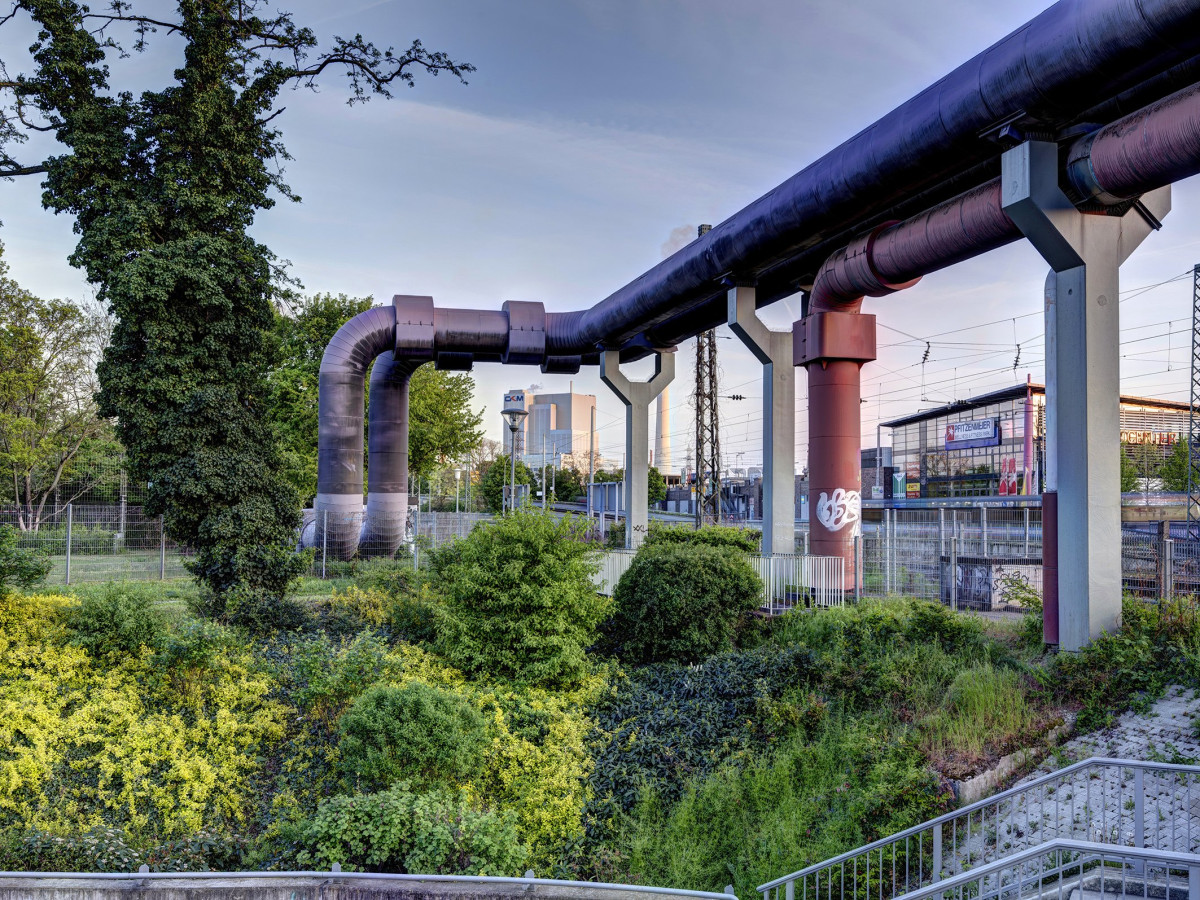Pioneering German city's gas grid phase-out hit by “uncertain” government policy
Mannheim’s plan to decommission its gas grid is being made harder by the new German government’s “uncertain” approach to decarbonising buildings, the head of the city’s energy supplier has said.
Mannheim, a city with a population of some 320,000 in southwest Germany, is the first city in the country to set a date for the phaseout of its gas grid, aiming to switch households over to heat pumps or district heating by 2035. Other major cities such as Hanover, Stuttgart or Munich have also presented plans to phase out their gas grids over the next two decades.
Theoretically, Germany’s gas grid could be repurposed to carry climate-neutral fuels such as biogas or hydrogen. But these are expected to be prohibitively expensive, so the think tank Agora Energiewende anticipates that the net zero transition will render more than 90 percent of the country’s gas grid useless.
Where Mannheim leads, many other cities will have to follow. But according to Gabriël Clemens, chief executive of the city’s energy supplier MVV Energie AG, following this trailblazing path has become more arduous since the last election, during which the victorious Christian Democrats pledged to “abolish” regulations designed to stimulate the uptake of clean heating alternatives, such as heat pumps.
The city has been encouraging residents to replace their gas boilers as soon as possible, warning that grid fees are likely to rise as the grid nears its expiration date. But since the election they have become more hesitant to do so, Clemens said.
“I’m worried that [the gas phaseout] will become harder because we have uncertainty in the system now, and as long as there is uncertainty, nobody will move,” Clemens said. “People are very reluctant now to take a decision at all because they have no clue in what direction it will go.”
In the run-up to the election, the Christian Democrats pledged to abolish the former coalition’s so-called ‘heating law,’ which requires new heating systems in new buildings to run on at least 65 percent renewable energy. The law was the previous government’s signature effort to reduce the 15 percent of Germany’s carbon emissions that come from heating buildings.
From next year, the law’s clean heat stipulation will also apply to the installation of new heating systems in old buildings in large cities, and from 2028 it will apply to those in smaller settlements.
"You need to give clarity that gas will come to an end."
Germany aims to become climate neutral by 2045. Over 70 percent of the country’s heating demand is still supplied by gas or heating oil, and given that gas boilers have a lifetime of around 20 years, action is needed today to avoid the fossil fuel lock-in of new boiler systems. Several low-carbon home heating systems already exist, but often come with trade-offs that hold back their uptake.
The government is offering households subsidies to cover up to 70 percent of the cost of a new clean heating system.
The Christian Democrats argued that the law was too much of a constraint on individuals’ choices about how they heat their homes. They said that rather than requiring people to replace their boilers, they would merely incentivise them to do so via rising carbon taxation on home heating.
Germany’s carbon price on heating emissions is indeed expected to rise steeply, especially in the years after 2027 when it is subsumed into the EU’s Emissions Trading Scheme 2, which will cover emissions from heating and transport. Some analysts have predicted the price could rise from 55 euros per tonne of CO2 today, to more than 200 euros per tonne by the mid-2030s.
Yet, despite the Christian Democrats’ criticism of the "heating law", it is unclear how much they will actually change it now they are sharing power with one of the parties who sponsored it, the Social Democrats (SPD). In their coalition agreement the parties pledged to pass a “new Building Act, more technologically open, flexible and simpler” – which could end up being very similar to the old Building Act.
According to Uta Weiss, programme lead for buildings and heat grids at Agora Energiewende, the new government’s promise to drastically change heating policy “should be taken with a pinch of salt [...] all the heating companies are telling the government: ‘please don’t change the rules now, we just got used to them’.”
Clemens expects the act will be “renamed so that formally they can say they cancelled it, but most of the content will remain,” he said. “But what worries me most is the uncertainty [...] You need to give clarity that gas will come to an end.”
The reason Clemens is so concerned about the new government’s unclear messaging is that the phase-out of the grid depends on the people of Mannheim replacing their heating systems swiftly and uniformly. If instead some people decide to stick with their gas boilers, then they could face steeply rising bills – a situation that Clemens describes as “a recipe for poverty, a recipe for unacceptance.”

The ideal situation for MVV would be if the company can decommission the gas grid neighbourhood by neighbourhood. That way, it could steadily reduce its maintenance costs, minimising households’ grid fees. But it will only be able to do that if every household in each neighbourhood decides to switch their heating systems. If however only a few households here and there decide they want to keep their boilers, MVV will have to maintain the entire gas grid just to keep a few households warm – and it will have to charge them exorbitant grid fees for the privilege.
“If there’s only ten percent of demand for gas, and the same total cost of maintaining the entire gas grid, the remaining households will have to pay ten times more to maintain it, provided there is no regulation for social cushioning,” Clemens said.
To avoid this situation, the local government has embarked on an information campaign, highlighting that those homes who switch their heating system early can expect to save money as carbon prices and grid fees rise. It has also worked with the local bank to offer households a heat pump financing package, at 99 euros a month with no further upfront costs.
But while MVV and the local government can encourage households to swap their heating systems, they are waiting on the federal government to answer some of the really difficult questions raised by the gas grid phaseout.
The first of those questions is, if a few households are preventing MVV from shutting down entire sections of the grid, should the government force them to cooperate? “If there is just one person [in a neighbourhood] who says ‘I’m 95, I don’t need a new heating system’, then it will become difficult,” Clemens said. He added that the government had to introduce a mechanism to ensure that, in the end, all customers switched.
If the government is going to force those last few households to cooperate, it might also have to pay them to do so, which raises a further question: how do you stop households attempting to game the system by waiting until the last moment to replace their boilers? “The biggest risk is that if people know the late runners will get support, then nobody is going to start to move,” Clemens said.
We’re trying to lobby for a national financial instrument to help latecomers, but at the same time you have to avoid the wrong incentives.
Clemens and Christian Specht, Mannheim’s Lord Mayor, expect the federal government to address these questions in the next year, as the EU has given member states until August 2026 to introduce plans to legislate the decommissioning of gas grids. The directive states that, if countries choose to phase out gas to achieve climate targets, it should be possible for them to refuse access to or disconnect users to infrastructure that will be decommissioned – though affected users should be adequately protected.
“It’s not the first task of cities to create a funding solution,” said Specht. “We’re trying to lobby for a national financial instrument to help latecomers, but at the same time you have to avoid the wrong incentives. If we have a federal instrument for this, then maybe we can create a smaller, second instrument [to help latecomers make the transition].”
Until the federal government legislates the decommissioning of the gas grid, there will be no legal basis for Mannheim to decommission its own. “It’s even worse,” said Clemens. “If a new customer wants to have a connection to the gas grid, we have to connect them. It makes no sense, but we have to do so.”
Clemens described the 2035 phase-out date not as a “fixed date” but as a “polar star [...] Whether it’s 2035, 2033, 2037, that’s not the difference. But you have to start. No one can manage the transition for 25,000 gas heaters in one day.”
Agora's Weiss expects there will be a moment in the new coalition government’s new term when it has to decide whether or not to encourage other cities to phase out their gas grids. “By 2028, all cities have to come up with municipal heating plans [to decarbonise heating]. I don’t think we’ll see many heating plans with a large role for the gas grid. The obvious conclusion will be that these grids won’t be used anymore, so they will have to be decommissioned.
“The question is, will the heating companies go public with those plans, and will the government help them with that, or will it not?”
Ben Cooke is the Environment Correspondent at UK newspaper The Times. He spent two months at CLEW as an International Journalists’ Programmes (IJP) fellow.

